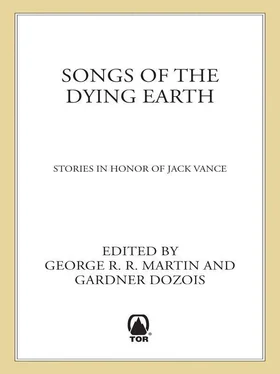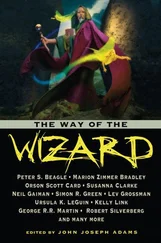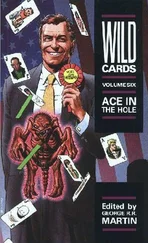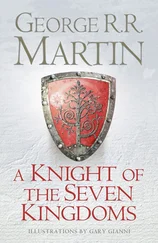Shrue tried to shake away the debilitating melancholy and concentrate on the task ahead, but — as he was also too prone to do — he wondered, not for the first or ten-thousandth time, what his real motive was in entering the Ultimate Library and reading Ulfänt Banderōz’s books. Knowledge said part of his mind. Power whispered a more honest part. Curiosity argued an equally honest part. Control of the Dying Earth said the deepest and least-dissimulating core of the diabolist’s weary and melancholy brain.
“Are you going to land this rag?” asked Derwe Coreme over his shoulder. “Or are we just going to circle a thousand feet above the Dirindian until the sun comes up?”
Shrue brought the carpet down to a three-foot hover and dejinkered it as they stepped off. KirdriK was waiting just outside the phase fields as ordered. Either he had shed his monk’s robes or the beasties on his way up had clawed and chewed them off in their dying seconds.
“Great Krem,” whispered the war maven Myrmazon leader, hand going reflexively to her sword. “You choose ugly servants, Shrue.”
“You should see Old Blind Bommp,” said KirdriK through his rasp and gargle and growl.
“Silence,” commanded Shrue. “I have to study Ulfänt Banderōz’s layers of defensive fields.”
Within a moment, he knew that the vile Faucelme had been essentially correct: there were a dozen layers to the Library’s defenses, eight of them active spells, four of them — counting the ghost — physical. As he probed and countered, Shrue felt something like disappointment fill him. Ulfänt Banderōz had been one of the arch-maguses of all magi still living on the Dying Earth, but these defenses — while deadly enough to the average magician or would-be barbarian vandal — were easy enough to foil and countermand. Shrue had to spend less than five minutes on the first eight, and as for the spellbound circling (and starving) wolves, stone-ghouls, and vampire necrophages, KirdriK put them out of their misery within seconds.
They stepped across the massive old drawbridge — the Library’s moat was more decorative than serviceable, although Shrue saw croc-men swimming in the black water — and were confronted by the equally massive door sporting a surprisingly heavy lock.
“Are you going to blast that off?” asked Derwe Coreme. “Or would you prefer me to use my blade?”
“Neither you nor your blade would survive, I fear,” Shrue said softly. “Civilized people use a key.” He pulled one from his robes, fit it, clicked it, and opened the heavy door. Answering the Myrmazon’s quick, sharply questioning gaze, Shrue added, “I was a guest here long ago and took the liberty of studying the lock then.”
The inside of the Ultimate Library was dark and silent, the air dead, as in a room or crypt that had been closed up for centuries rather than weeks. Wary of boobytraps, Shrue had KirdriK emit a soft but bright glow from his chest that illuminated everything for twenty paces in front of the three of them. Shrue also allowed the daihak to lead the way, although always while under the diabolist’s guidance. They moved from room to room, then from floor to floor, up stairways rimned with dust. Here and there on the floor lay what they first took to be stone statues — short, nonhuman shapes — until finally Shrue said, “These are Ulfänt Banderōz’s servants or apprentices. It seems they also turned to stone when he died.”
On each level of the darkened library, there were racks and shelves and stacks of books, most of the volumes a third to half as tall as Shrue himself. When they had progressed far enough that Shrue was moderately certain that there would be no goblin attack or sudden, deadly efulsion of dark forces, he lifted a dusty volume off its shelf and set it down heavily on an ancient, high, and slanted wooden reading table.
“I’m interested to read whatever this is,” whispered Derwe Coreme. It was hard to speak at normal volume in the echoing spaces.
“Be my guest,” said Shrue and opened the large book. He read — or rather, looked — over the war maven’s dragonscaled shoulder. The yellowish light from KirdriK’s chest was more than ample.
Derwe Coreme’s head snapped back as if she had been slapped. Shrue himself tried to focus, but the sentences and words and very letters shimmered in and out of focus and visibility as if they were written in quicksilver.
“Ah,” cried the woman warrior. “That gives me a blinding headache just trying to bring a word into focus.”
“Men have gone blind staring at these books,” whispered Shrue.
“Magicians, you mean,” said Derwe Coreme.
“Yes.”
“Can your monster read it?” she asked.
“No,” croaked KirdriK. “I am literate in more than nine hundred phonetic and glyphic alphabets and more than eleven thousand written languages, living and dead, but these symbols scatter like cockroaches when a light is turned on.”
Shrue smiled dryly and applauded in the direction of Derwe Coreme and his daihak. “Congratulations,” he said to the woman. “You’ve just elicited the first simile I’ve heard from KirdriK in more than a hundred…”
There came a sound from the darkness behind them.
Derwe Coreme whirled and her long blade glittered in KirdriK’s chest-light. The daihak balled his huge six-fingered fists and showed a wall of teeth. Shrue raised three long fingers, more in restraint of his companions than in defense.
A short — no more than four feet tall — form stepped from the shadows and a genderless voice squeaked, “Do not harm me! I am a friend.”
“Who are you?” demanded Shrue.
“ What are you?” asked the Myrmazon leader.
“I am called Mauz Meriwolt,” squeaked the little form. “I was — have always been, since birth — Ulfänt Bander — oz’s servant boy.”
“Boy?” repeated Derwe Coreme and lowered her sword.
Shrue had his Expansible Egg incantation ready to surround them at the utterance of a final syllable, not to mention his Excellent Prismatic Spray spell ready to slice this newcomer to ribbons in an instant, but even the diabolist — who judged few things or people upon their appearance — sensed no threat from the tiny form. Mauz Meriwolt was pibald in hue, with arms and legs thinner and more rubbery than Shrue’s old wrists, tiny three-fingered hands, an oversized head with oversized ears placed too far back, a long proboscis with only a few whiskers protruding, and enormous black eyes.
“ What are you?” repeated Derwe Coreme.
The little person seemed befuddled by the question, so Shrue answered for him. “Ulfänt Banderōz had the affectation of recreating lost life forms from the dim past to fill his staff,” he said softly. “I believe that our short friend Mauz Meriwolt came from some long-forgotten line of rodents.”
“You can call me Meriwolt,” squeaked the shy little form. “The ‘Mauz’ was some sort of honorific…I think.”
“Well, then, Meriwolt,” said Shrue, his voice carrying an edge, “perhaps you can explain why you survived here when all of Ulfänt Banderōz’s other servants appear to have been turned into stone like their master.” The magus gestured toward a stone figure on the floor — what might have been a humanoid attempt at the ancient life form called a feline.
“That’s Gernisavien, the Master’s neo-cat and tutor to all of us lesser servants,” said Meriwolt. “She…changed…at the instant of the Master’s death, as did all the others.”
“Then we ask again,” said Shrue. “Why not you?”
The little figure shrugged and Shrue noticed for the first time that Meriwolt had a skinny but short whip of a tail. “Perhaps I was not important enough to turn to stone,” he said, his voice squeaking with misery. “Or perhaps I was spared because — despite my unimportance — the Master seemed to feel some affection for me. Master Ulfänt Banderōz was not widely known for his sentimental side, but it may be the reason I was spared when all the others died when he did. I can think of no other.”
Читать дальше











